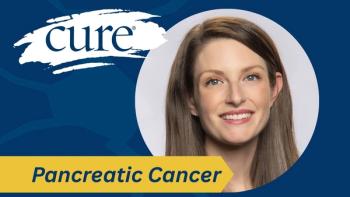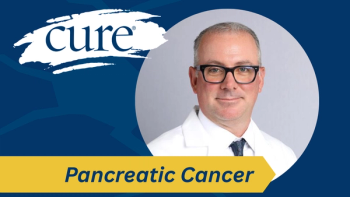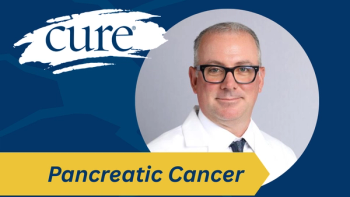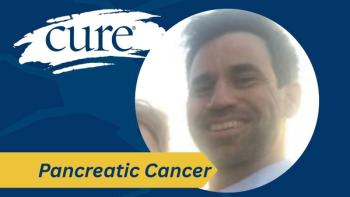
- Winter 2019
- Volume 18
- Issue 1
Changing Our Standards
Patients with pancreatic cancer face barriers to clinical trials as a standard of care.
Those who have inoperable pancreatic cancer are generally offered chemotherapy regimens that may extend life for just a couple of months at a high cost. That’s why many experts believe that clinical trials need to become the standard of care, allowing patients to benefit from the search for better therapies, especially targeted drugs and immunotherapies.
“We are just bombarding them with chemotherapy, which is of no use, and they go through so much pain and so much suffering,” says Pinku Mukherjee, Ph.D., a professor and chair of cancer biology and immunology at the University of North Carolina at Charlotte.
Roberta Luna, shown with her husband, Vic, would like clinical trial criteria loosened, so she can participate.
Yet only about 5 percent of patients nationally actually enter clinical trials, partly because of restrictive enrollment criteria, says Anirban Maitra, M.B.B.S., a professor of translational molecular pathology and scientific director of the Sheikh Ahmed Bin Zayed Al Nahyan Center for Pancreatic Cancer Research at The University of Texas MD Anderson Cancer Center in Houston. Having HIV or a history of another cancer, for example, should not be exclusions for most trials, he says, yet they are.
Roberta Luna, a 62-year-old commu­nity volunteer and former paralegal in Santa Ana, California, knows firsthand how it feels to be excluded from myriad clinical trials. She wanted to find one that would offer something better than the 16 years of chemo­therapy she has undergone to keep her stage 3 pancreatic cancer in check. “My tumor is inoperable because of the location — it’s entwined with the main artery like ivy,” Luna says. “There’s nothing they can do with it yet, so my hope is that they can keep the cancer at bay until they can do something to take it out.”
Her regimen has been “putting poison in my body, and it’s going to affect me at some point,” she says. She has known people who died from treatment toxicity, not their cancer, and she recently learned that years of chemotherapy appear to have affected her heart. But she has few options.
Luna has both types of pancreatic cancer — exocrine adenocarcinoma and a neuroendocrine tumor — and just one kidney. She was born with a nonfunctioning kidney that was removed when she was 3 years old. Her unique situation, plus over a decade of chemotherapy, excludes her from nearly all clinical trials.
“It is very frustrating, because you don’t know what might be out there that could possibly help you,” Luna says. “It makes you feel like they’re not even giving you a chance.”
She believes that when doctors keep those doors closed, it’s because both they and their patients consider clinical trials a last-ditch option. All the stake­holders should instead look at clinical trials from the start, Luna says, particularly because any trial will provide at least the current standard of care.
“Especially for pancreatic cancer, we don’t have a whole lot of drugs out there, so trials are really something we should consider first,” she says. “It will help us, but it will also help others, because clinical trials are the only way we’re going to find out what drugs might work. This disease sometimes takes away so much control from you. … Helping somebody else is one little aspect you can control, and a major way to do that is (by) participating in a clinical trial.”
ROBERTA LUNA helps set up for the Pancreatic Cancer Action Network’s PurpleStride Orange County 2018 in Irvine, California, in November.
Both she and Scott Nelson, a Minneapolis resident who received a diagnosis of pancreatic cancer in 2004, say the disease’s low survival rate and rapid spread after detection can deter doctors from seeking options beyond standard care, and patients are hardly in a mental state to research trials themselves. “First you’re in shock, then you’re angry, then you decide you’re going to fight this, but you don’t know what to do,” Nelson says. “You’ve got to make these life or death decisions in a very short period of time.”
Nelson recommends that patients take two steps imme­diately after diagnosis: Find a high-volume medical center that has many physicians special­izing in pancreatic cancer, and call the Pancreatic Cancer Action Network (pancan.org), a nonprofit patient advocacy group that takes a patient’s information and searches for clinical trials for him or her. If patients struggle with the first step, the network can help them find a treatment center.
“They will walk you through what you have to do, and you keep that phone representative all the way through the process in future calls,” Nelson says.
Articles in this issue
almost 7 years ago
Positively Deleteriousalmost 7 years ago
Tutu Goodalmost 7 years ago
Paying it Forward: Donating Time in the Cancer Communityalmost 7 years ago
Hockey Player Announces His Cancer Is In Remissionalmost 7 years ago
Ginsburg Returns to Work During Recovery From Lung Surgeryalmost 7 years ago
Findings Link Diet Soda With Reduced Risk of Colon Cancer Recurrencealmost 7 years ago
The Long Haul: Facing the Long-Term Side Effects of Testicular Canceralmost 7 years ago
Should Patients Have to Pay for the Drugs They Helped Test?almost 7 years ago
Sweet Surrender: Will Cutting Out Sugar Help You Prevent Cancer?almost 7 years ago
Beyond the Norm



